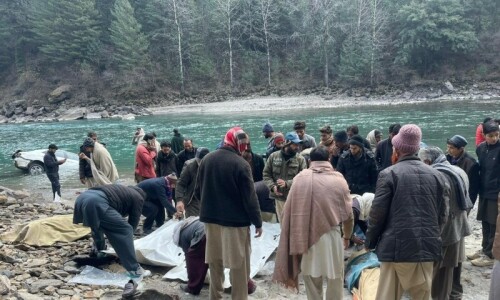ISLAMABAD: A high-level panel of speakers including policy makers, human rights activists and judge of the Supreme Court on Tuesday urged society and institutions to look into the shortcomings for addressing gender-based violence cases.
They were attending a seminar to commemorate International Human Rights Day, under the theme ‘Linking Rights to a Future Free from Gender-Based Violence’, and celebrating the 16 Days of Activism against Gender-Based Violence (GBV). The event was organised by the Sustainable Development Policy Institute (SDPI).
Justice Ayesha A. Malik of the Supreme Court of Pakistan called for urgent action against gender-based violence and emphasised the deep-seated imbalance between men and women that was entrenched in societal and cultural norms.
She called for societal outrage over the rise in sexual violence, particularly against minors and women.
“The violation of a woman’s dignity must not be tolerated,” she said, adding that resistance to gathering accurate data hampers efforts to understand and address the crisis.
“Without data, there can be no comprehensive understanding of the problem, let alone a solution,” Justice Malik noted, lamenting that the current lack of clarity about domestic violence statistics complicates efforts to tackle this crime effectively.
She criticised the judgmental attitudes faced by women in GBV cases, a problem deeply rooted in subcontinental culture, where women were frequently accused of lying. This lack of a gender perspective weakens the narrative around GBV and perpetuates societal biases. Justice Malik concluded by calling for gender-based violence to be treated as a priority.
Prime Minister’s Coordinator on Climate Change and Environmental Coordination Romina Khurshid Alam highlighted the critical need for educational reforms to address gender-based violence, especially in public schools.
She also pointed out that stigma and societal discrimination continued to suppress women’s voices and perpetuate violence.
Chair of the Senate Standing Committee on Human Rights Senator Samina Mumtaz Zehri addressed challenges in the implementation of existing laws, highlighting the gaps in data collection and public awareness regarding avenues for reporting violence. She called for reforms in the police and judicial systems to better support victims of gender-based violence.
Secretary General of the Human Rights Commission of Pakistan (HRCP) Harris Khalique discussed the alarming global statistics on gender-based violence, noting that one in three women experienced physical or psychological trauma, with even higher rates in Pakistan.
Law and Justice Commission of Pakistan (LJCP) Chairman Riffat Inam Butt underlined the necessity of improving data collection and ensuring access to legal resources for women.
Development Councillor at the British High Commission Andrew Bowden echoed the need to break societal taboos around gender-based violence. He emphasised that empowering women economically and ensuring gender equality in development were key priorities for UK’s global mission.
Earlier in his welcome remarks, SDPI Executive Director Dr Abid Qaiyum Suleri emphasised that sustainable development was incomplete without incorporating human rights and gender equity.
UN Women
‘The Rolling Resistance: Theatre on Wheels campaign’, a cornerstone of UN Women Pakistan’s 16 Days of Activism Against Gender-Based Violence, reached its conclusion on Tuesday at the Pak-China Friendship Centre.
The groundbreaking initiative, which has travelled across Pakistan, delivered its poignant message of #KoiJawaazNahi (#NoExcuse) to a national audience, sparking dialogue and inspiring collective action against gender-based violence (GBV).
UN Resident Coordinator in Pakistan Mohamed Yahya highlighted the United Nations’ commitment to supporting gender equality.
“As we conclude this year’s 16 Days of Activism Against Gender-Based Violence, I want to honour the resilience of survivors of domestic violence. These women and girls have faced unimaginable pain, yet their courage to rebuild their lives inspires us all,” Mr Yahya said.
Country Representative Designate UN Women Pakistan Jamshed Kazi opened the event, emphasising the campaign’s transformative journey.
“Gender-based violence is not merely a women’s issue; it is a profound human rights crisis that impacts every aspect of society. Achieving gender equality and eradicating gender-based violence requires the unwavering dedication of individuals, organisations, and institutions. Campaigns like Rolling Resistance and The Inkvisible exemplify the power of collaboration and the transformative potential of united efforts,” Mr Kazi said.
Coordinator to the Prime Minister on Climate Change and Environment Coordination Romina Khurshid Alam reaffirmed Pakistan’s commitment to gender equality, saying, “the government of Pakistan is committed to ensuring that Pakistan becomes a country where women and girls can thrive without the shadow of violence”.
The concluding candle lighting ceremony brought together attendees in a solemn moment of reflection and unity, symbolising the shared resolve to illuminate the path toward a violence-free society.
Published in Dawn, December 11th, 2024













































Dear visitor, the comments section is undergoing an overhaul and will return soon.